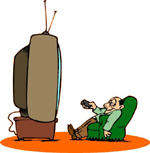|
Comment on this article |
View comments |
Email this Article
|
|
News :: Media |
|
Public Comments Overwhelmingly Support Media Diversity |
Current rating: 0 |
by reclaimthemedia.org
(No verified email address) |
16 May 2003
|
|
The minions of an unelected pResident feel they can safely ignore overwhelming public opinion |
|
Fewer than one percent of public comments received by the FCC support loosening media ownership restrictions; the vast majority of comments were submitted by individual citizens opposed to deregulation. This has been confirmed by a survey conducted by the Future of Music Coalition (http://www.futureofmusic.org/news/PRFCCdocket.cfm) and Free Press (http://www.mediareform.net), tabulating all comments available on the FCC website (http://gullfoss2.fcc.gov/prod/ecfs/comsrch_v2.cgi).
"Reading the comments in this docket has been both inspiring and disheartening," said FMCís Director of Research Kristin Thomson. "Many citizens express a growing dissatisfaction with the trends in their local media, and insist that the FCC show a genuine commitment to localism, competition and diversity. But itís also frustrating to know that, even with the vast majority of comments expressing decisive opposition to the rule changes, citizensí voices seem to be falling on deaf ears."
Related stories on UC IMC:
The Impending Media Consolidation Story -- What The FCC Is Up To & Why We're Begging For Crumbs
http://www.ucimc.org/newswire/display/11606/index.php
Stop The FCC
http://www.ucimc.org/newswire/display/11641/index.php
When The Media Fails
http://www.ucimc.org/newswire/display/11712/index.php
Come To The Allied Media Conference
http://www.ucimc.org/newswire/display/11763/index.php |
See also:
http://www.reclaimthemedia.org/
|
|
More Media Monopolies To Create Monotony In U.S. |
by The Guardian (Britain)
(No verified email address) |
Current rating: 0
16 May 2003
|
 |
One US, one market, one media mogul
Friday May 16, 2003
The Guardian
The war in Iraq has sharpened fears among US media pundits that objectivity has gone out of the window in the service of a handful of media tycoons. In a recent article, the Los Angeles Times railed against the shameless editorialising on the Rupert Murdoch-owned Fox News during the conflict, denouncing the "swirling sands of spin" and criticising the "hyperventilating" anchors.
The conservative media meanwhile cling to the notion that the media are overrun by the liberal agenda. Fox on one occasion rudely dismissed the Guardian as an authoritative source. Anchor Shepard Smith later hinted that it might have an agenda for doubting the ruthless efficiency of the Pentagon.
Against this backdrop, the US is intending to relax media ownership laws further, allowing the largest media companies to deepen their presence in established markets and expand into new ones. The federal communications commission, the regulator for the US media and telecommunications industries, will vote on the measures on June 2.
The proposals have not been published but large parts have leaked to the press. They include allowing the same company to own a broadcaster and a newspaper in all but the smallest markets. Another change would increase the television ownership cap, effectively allowing a network to own stations that reach up to 45% of the viewers in the US, lifting the limit from 35%.
A third change would allow the same company to hold up to three television stations in the largest markets, from the current threshold of two.
The vote is split down party lines. The five-strong board is made up of three Republicans, including chairman Michael Powell, who are expected to vote in favour of the new regulations, and two Democrats, who are likely to vote against. Mr Powell, the son of the secretary of state, drew up the plans.
The political split suggests that the LA Times is closer to the truth than Fox in assessing who is running the US media. The relaxation of ownership rules seems certain to further stifle voices in a country, where, with the exception of New York and LA, there is scant opposition to the prevailing view handed down by the White House.
In many of the medium-sized markets, including Dallas, Seattle and Detroit, there is only one, or maybe two newspapers of note. In most cases, lacking competition, they are hardly pressed to create a stir in order to win readers. With the possibility that they could now be owned by the local broadcaster, plurality of views will be further reduced.
British websites, including Guardian Unlimited and the BBC, attracted a big increase in traffic from the US during the Iraq war as people sought an alternative voice.
The Democrats on the FCC board are seeking a month's delay to the June 2 vote, hoping to generate more debate.
The network owners have argued that they need to generate synergies by owning more stations. Viewership of the free-to-air stations is dwindling against the ever growing number of cable channels and programming costs continue to escalate.
Mr Murdoch this week described the British and Australian media as a "little bit paranoid" about his acquisition plans. There is perhaps a tendency in Britain to believe that the spectre of Mr Murdoch is sitting over every editorial decision. But a little paranoia is more welcome than the sleepwalk toward further consolidation that will leave the powerful American media in the hands of a few powerful men. |
See also:
http://media.guardian.co.uk/broadcast/story/0,7493,957136,00.html
|



